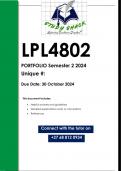Examen
LPL4802 Portfolio (QUALITY ANSWERS) Semester 2 2024
- Grado
- Institución
- Book
This document contains workings, explanations and solutions to the LPL4802 Portfolio (QUALITY ANSWERS) Semester 2 2024. For assistance whats-app us on 0.6.8..8.1.2..0.9.3.4... QUESTION 1 (ESSAY) NATURE AND ASSESSMENT OF NON-PATRIMONIAL LOSS AND DAMAGES FOR PATRIMONIAL LOSS (4 pages, including rubr...
[Mostrar más]



